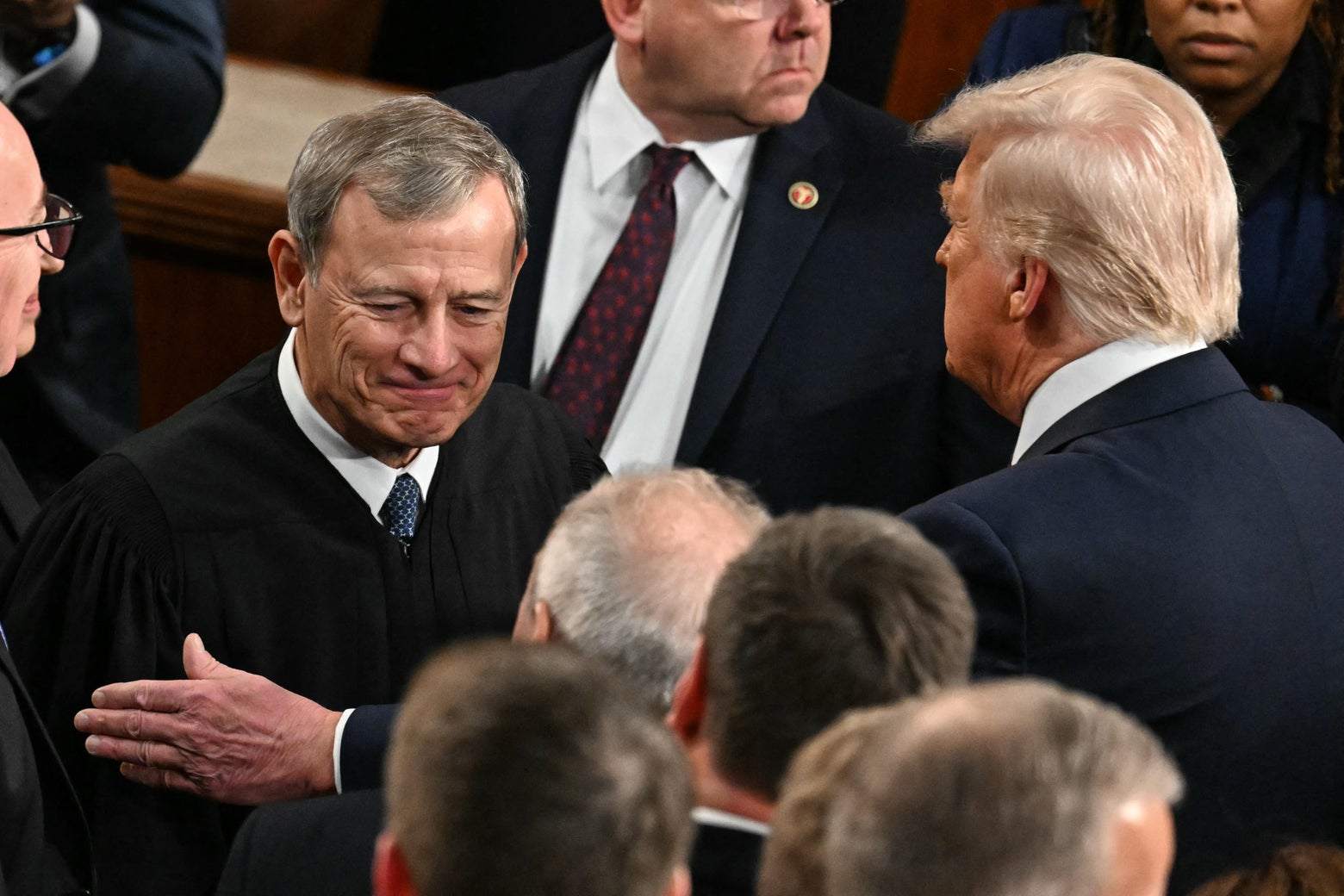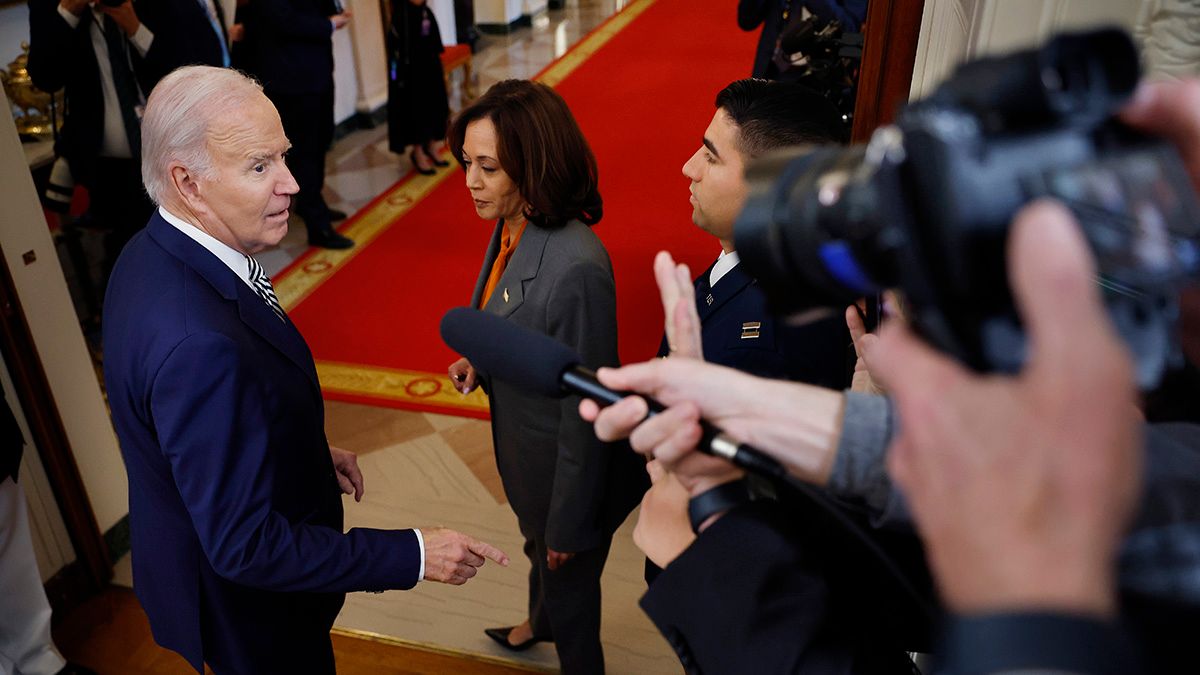Well..this is bit unusual--the SCOTUS has acted with unprecedented speed to halt the illegal deportations to El Salvador.
What was going on behind the scenes remains somewhat unknown, but apparently Justice Alito attempted an end run around the court....and was slapped down.

 slate.com
slate.com
Shortly before 1 a.m. on Saturday, the Supreme Court issued an emergency order halting the Trump administration’s reported efforts to fly Venezuelan migrants to an El Salvador prison before they could challenge their deportation. The court’s late-night intervention is an extraordinary and highly unusual rebuke to the government, one that may well mark a turning point in the majority’s approach to this administration. For months, SCOTUS has given the government every benefit of the doubt, accepting the Justice Department’s dubious assertions and awarding Trump immense deference. On Saturday, however, a majority of justices signaled that they no longer trust the administration to comply with the law, including the court’s own rulings. If that is indeed the case, we are likely careening toward a head-on conflict between the president and the court, with foundational principles of constitutional democracy hanging in the balance.
SCOTUS’s emergency order in A.A.R.P. v. Trump arose out of the government’s unlawful efforts to ship Venezuelan migrants to a Salvadoran prison by invoking the Alien Enemies Act of 1798. On Thursday, lawyers for these individuals told a federal court that the government was preparing to summarily deport them to El Salvador, where they would be indefinitely confined at a notorious detention center. A federal judge in the Southern District of Texas had already blocked their removal—but the government sought to evade this order by busing the migrants into the Northern District of Texas, where the restraining order would not apply. It then gave these migrants “notices,” in English only, declaring that they would be deported immediately, without stating that they could contest their deportations in court. (Officials refused to give these notices, or any other information, to the migrants’ lawyers.) The government intended to fly them out of the country within 24 hours, according to court filings.
The ACLU then begged the Supreme Court for help. And the court obliged. The majority directed the government “not to remove” any of the individuals seeking relief “until further order of this court.” As a result, the government was unable to deport the migrants to El Salvador—as it appeared about to do—and they remain in U.S. custody. Only Justices Samuel Alito and Clarence Thomas noted their dissents.
There are three remarkable aspects of the court’s decision. First, it acted with startling speed—so quickly, in fact, that it published the order before Alito could finish writing his dissent; he was forced to note only that a “statement” would “follow.” It is a major breach of protocol for the Supreme Court to publish an order or opinion before a dissenting justice finishes writing their opinion, one that reflects the profound urgency of the situation. Relatedly, awkward phrasing in court’s order may imply that Alito—who first received the plaintiffs’ request—failed to refer it to the full court, as is custom, compelling the other justices to rip the case away from him. No matter what, exactly, happened behind the scenes, it’s clear that a majority would not let Alito hold up speedy action. It also acted before the U.S. Court of Appeals for the 5th Circuit had a chance to step in, and before the Department of Justice had an opportunity to respond to the plaintiffs. These highly abnormal moves also reveal a desire to act fast.
Second, it is plain as day that the Supreme Court simply did not trust the Trump administration’s claims that it would not deport migrants over the weekend without due process.
Finally, and perhaps most obviously, it’s critical that only Thomas and Alito noted their dissents. When the court takes emergency action, justices don’t have to note their votes, but they usually do; we can probably assume that this order was 7–2. That would mean that Chief Justice John Roberts—along Justices Neil Gorsuch, Brett Kavanaugh, and Amy Coney Barrett—joined this rebuke to the Trump administration. Until now, all of these justices have, to varying degrees, treated the president with kid gloves, handing him a series of narrow wins on procedural grounds that avoided direct collision between the branches. That accommodation came to an abrupt stop on Saturday
What was going on behind the scenes remains somewhat unknown, but apparently Justice Alito attempted an end run around the court....and was slapped down.

The Supreme Court’s Late-Night Rebuke to Trump Is Extraordinary in More Ways Than One
The court didn't even wait to let Alito file his dissent.
Shortly before 1 a.m. on Saturday, the Supreme Court issued an emergency order halting the Trump administration’s reported efforts to fly Venezuelan migrants to an El Salvador prison before they could challenge their deportation. The court’s late-night intervention is an extraordinary and highly unusual rebuke to the government, one that may well mark a turning point in the majority’s approach to this administration. For months, SCOTUS has given the government every benefit of the doubt, accepting the Justice Department’s dubious assertions and awarding Trump immense deference. On Saturday, however, a majority of justices signaled that they no longer trust the administration to comply with the law, including the court’s own rulings. If that is indeed the case, we are likely careening toward a head-on conflict between the president and the court, with foundational principles of constitutional democracy hanging in the balance.
SCOTUS’s emergency order in A.A.R.P. v. Trump arose out of the government’s unlawful efforts to ship Venezuelan migrants to a Salvadoran prison by invoking the Alien Enemies Act of 1798. On Thursday, lawyers for these individuals told a federal court that the government was preparing to summarily deport them to El Salvador, where they would be indefinitely confined at a notorious detention center. A federal judge in the Southern District of Texas had already blocked their removal—but the government sought to evade this order by busing the migrants into the Northern District of Texas, where the restraining order would not apply. It then gave these migrants “notices,” in English only, declaring that they would be deported immediately, without stating that they could contest their deportations in court. (Officials refused to give these notices, or any other information, to the migrants’ lawyers.) The government intended to fly them out of the country within 24 hours, according to court filings.
The ACLU then begged the Supreme Court for help. And the court obliged. The majority directed the government “not to remove” any of the individuals seeking relief “until further order of this court.” As a result, the government was unable to deport the migrants to El Salvador—as it appeared about to do—and they remain in U.S. custody. Only Justices Samuel Alito and Clarence Thomas noted their dissents.
There are three remarkable aspects of the court’s decision. First, it acted with startling speed—so quickly, in fact, that it published the order before Alito could finish writing his dissent; he was forced to note only that a “statement” would “follow.” It is a major breach of protocol for the Supreme Court to publish an order or opinion before a dissenting justice finishes writing their opinion, one that reflects the profound urgency of the situation. Relatedly, awkward phrasing in court’s order may imply that Alito—who first received the plaintiffs’ request—failed to refer it to the full court, as is custom, compelling the other justices to rip the case away from him. No matter what, exactly, happened behind the scenes, it’s clear that a majority would not let Alito hold up speedy action. It also acted before the U.S. Court of Appeals for the 5th Circuit had a chance to step in, and before the Department of Justice had an opportunity to respond to the plaintiffs. These highly abnormal moves also reveal a desire to act fast.
Second, it is plain as day that the Supreme Court simply did not trust the Trump administration’s claims that it would not deport migrants over the weekend without due process.
Finally, and perhaps most obviously, it’s critical that only Thomas and Alito noted their dissents. When the court takes emergency action, justices don’t have to note their votes, but they usually do; we can probably assume that this order was 7–2. That would mean that Chief Justice John Roberts—along Justices Neil Gorsuch, Brett Kavanaugh, and Amy Coney Barrett—joined this rebuke to the Trump administration. Until now, all of these justices have, to varying degrees, treated the president with kid gloves, handing him a series of narrow wins on procedural grounds that avoided direct collision between the branches. That accommodation came to an abrupt stop on Saturday
